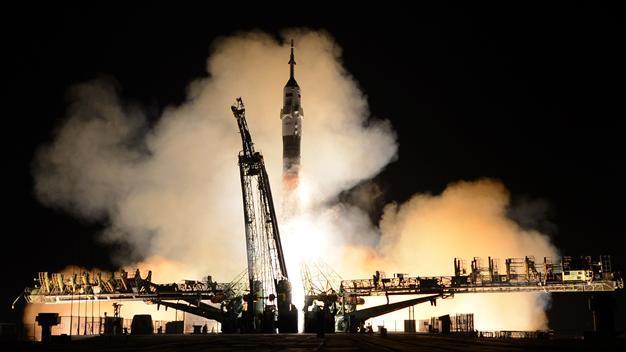Technical hitch delays US-Russia crew's ISS docking
MOSCOW - Agence France-Presse

A crew of two Russian cosmonauts and an American astronaut blasted off from Kazakhstan on a Russian Soyuz rocket for the International Space Station. AFP Photo
A US-Russian three man crew Wednesday faced an unprecedented two-day delay in their docking with the International Space Station (ISS) after their Russian Soyuz spacecraft suffered a technical glitch on its approach in orbit.
The two Russian cosmonauts and American astronaut were to have docked with the ISS early Wednesday just six hours after launch from Kazakhstan but the problem means that the docking is now only planned on Friday.
This means that the trio will now orbit the Earth 34 times before their rendezvous with the international space laboratory, instead of the fast track route of four orbits originally envisaged.
Russians Alexander Skvortsov and Oleg Artemyev along with Steve Swanson of NASA had earlier taken off from Russia's Baikonur cosmodrome in Kazakhstan in the spectacular night-time launch that initially went without problem.
The issue appeared to arise once their Soyuz capsule was in orbit and a thruster failed to fire to assist its approach for docking with the ISS.
The US space agency NASA said in a statement on its website that the Soyuz spacecraft "was unable to complete its third thruster burn to fine-tune its approach" to the orbiting space station.
The trio were using a fast-track approach to the ISS that Russia has been employing since 2013. After the problem, they are now using the traditional two-day longer approach that was employed up to 2012.
"Rendezvous experts are reviewing the plan, and may update it later as necessary," the US space agency said, adding that the trio on board were "in good spirits".
NASA said Russian flight controllers were reviewing data to work out why the third thruster burn did not occur as planned.
"Initial information indicates the problem may have been the spacecraft was not in the proper attitude, or orientation, for the burn," NASA said.
The head of Russia's space agency Roscosmos Oleg Ostapenko said the problem appeared to have been triggered by a hitch with the orientation system.
"The crew have taken off their space suits and are continuing their flight normally," he said.
The head of the Russian rocket state firm Energia that supplies the Soyuz rocket that propels the craft into space however said that the origin of the problem was not yet clear.
"It could be mathematics, it could be a transmitter problem or that the engine choked. But most likely it was a mathematical problem," said Vitaly Lopota, quoted by the Interfax news agency.
This would imply that ground scientists failed to work out the correct altitude in orbit for the thruster to fire to take the Soyuz to the ISS.
Roscosmos said that the docking was now provisionally expected at 3:58 am Moscow time Friday (2358 Thursday).
After the retirement of the US shuttle, NASA is for now wholly reliant on Russia for delivering astronauts to the space station on its tried-and-trusted Soyuz launch and capsule system.
US-Russia space cooperation has continued undimmed despite the diplomatic standoff over Ukraine and the joint work is seen as one of the few true success stories in post Cold War bilateral ties.
At the pre-flight news conference at Russia's Baikonur cosmodrome in Kazakhstan, senior astronauts Skvortsov and Swanson said that they had decided to have dinners together on board the ISS "as an opportunity to come together as friends in the kitchen and look each other in the eye".
Swanson also paid hommage to Yuri Gagarin, the Soviet cosmonaut who became the first man in space in 1961 with his flight from Baikonur.
"Yuri is a symbol for the whole world. I am proud to be part of history here," he said.
Skvortsov is making his second space flight and Swanson, a veteran of two past shuttle missions, his third.
Artemyev meanwhile is making his first voyage to space. He took part in a 2009 experiment where volunteers were shut up in a capsule at a Moscow laboratory for 105 days to simulate the effects of a possible voyage to Mars.
After docking, the trio will bring the ISS crew up to six by joining on board incumbent crew Koichi Wakata of Japan, American Rick Mastracchio and Russian Mikhail Tyurin.
